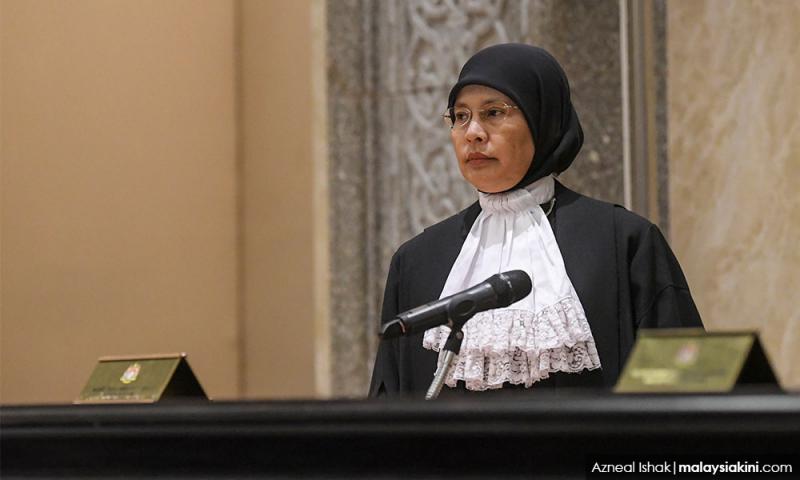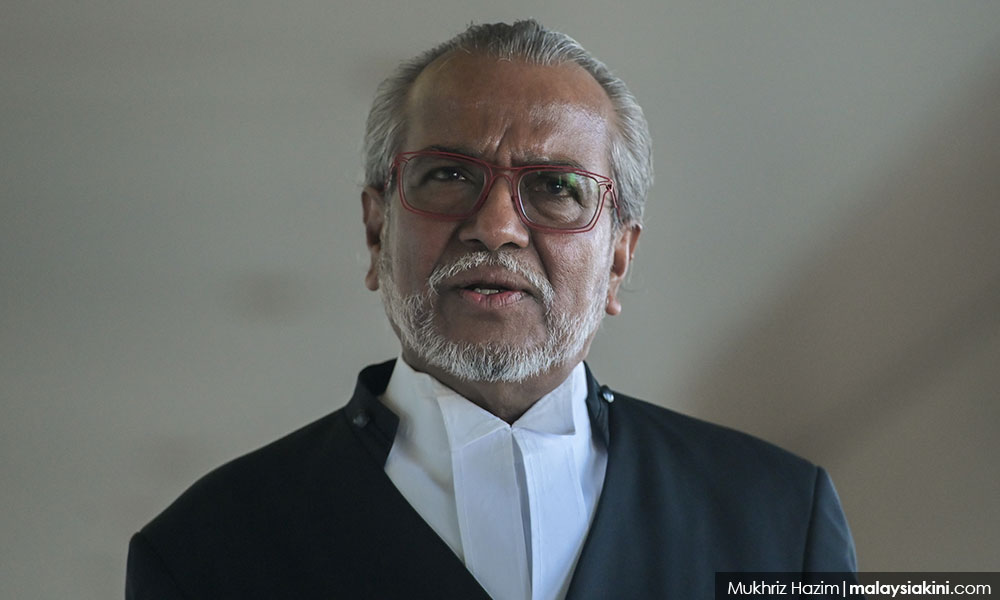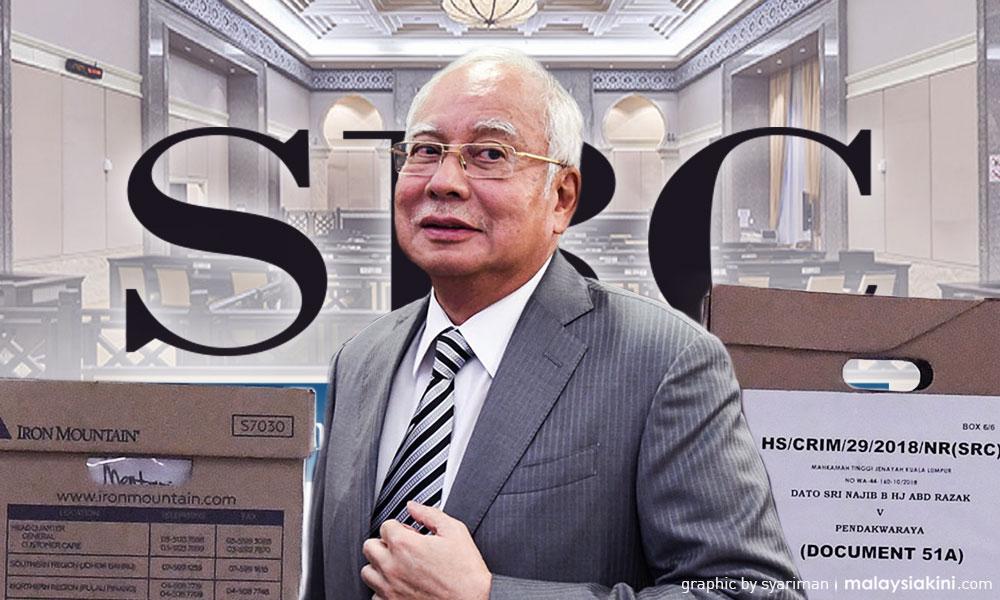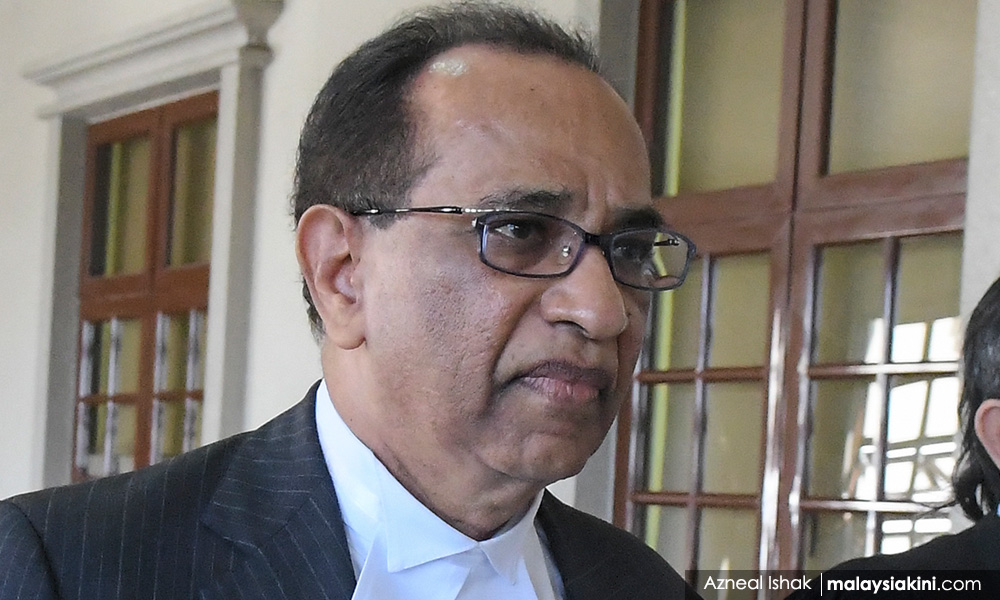
CJ shouldn't have heard Najib's SRC appeal, Shafee argues
Chief Justice Tengku Maimun Tuan Mat should not have been part of the Federal Court bench that heard Najib Abdul Razak’s SRC International conviction appeal last year, the former prime minister’s lead defence counsel contended.
Muhammad Shafee Abdullah told the five-person Federal Court bench - chaired by Chief Judge of Sabah and Sarawak Abdul Rahman Sebli - that Tengku Maimun’s husband Zamani Ibrahim had uploaded a Facebook (FB) posting in 2018, immediately after the 14th general election (GE14).
The current panel also comprises Federal Court judges Vernon Ong Lam Kiat, Rhodzariah Bujang and Nordin Hassan and Court of Appeal judge Abu Bakar Jais.
During today’s hearing of Najib’s application to review the previous Tengku Maimun-led Federal Court bench’s decision to dismiss his SRC appeal on Aug 23 last year, Shafee claimed that the online posting blamed the then prime minister for the downfall of Malaysian sovereign wealth fund 1MDB and its former subsidiary, SRC.
The Minister of Finance Incorporated (MOF Inc) fully owns both 1MDB and SRC. Najib used to be the finance minister as well.
The lawyer claimed there was quorum failure as it was untenable for Tengku Maimun (above) to hear the appeal when her husband was critical of Najib in the social media post.
“His (Zamani’s) severe criticism of Najib in 2018 as soon as the election results came out. It was almost a celebration in FB,” Shafee told the bench.
Shafee argued there was a conflict of interest due to the close union between the husband and wife, whereby the average married couple would share opinions.
‘FB posting removed in August last year’
The lawyer also contended that the FB posting was serious as it was removed in August last year.
“The matter was brought up on Aug 23 (last year) and this should have been considered more seriously as it amounted to quorum failure,” Shafee said in reference to the then Federal Court bench dismissing the defence team's recusal application against Tengku Maimun on the same day as the SRC appeal verdict.
Meanwhile, the lawyer also submitted that the then Federal Court bench did not perform any factual analysis of the 94 grounds of appeal by Najib.

Najib’s lead defence counsel Muhammad Shafee Abdullah
Shafee submitted that the previous panel failed to consider any of the 94 appeal grounds.
The lawyer claimed that the previous bench’s summation of the 94 appeal grounds was contained in mere three paragraphs of an eight-page judgment.
“No reasons were provided. No evaluation and analysis of the facts and law as well as arguments in the 94 (grounds) petition of appeal,” the lawyer contended.
Shafee added that the previous bench failed to evaluate the appeal grounds because Najib then had ineffective legal representation.
Shafee referred to the previous bench’s refusal to grant an adjournment of the appeal hearing by three to four months so that Najib’s then-legal team - which comprised counsel Hisyam Teh Poh Teik among others - would have been able to get more time to prepare for the appeal.
Shafee noted that the then-bench dismissed an application for Hisyam to discharge himself from representing Najib during last year’s appeal hearing - on grounds that Hisyam was unable to present a submission due to having no time to prepare.
He pointed out this resulted in a situation where Najib’s then-lawyers were unable to present any submissions while the then-Federal Court bench instead heard submissions from the prosecution, which was the respondent in the appeal.
The lawyer said this amounted to the then-bench hearing the prosecution’s side of the story, instead of Najib’s side.
Shafee submitted that the previous panel failed to consider any of the 94 appeal grounds.
The lawyer claimed that the previous bench’s summation of the 94 appeal grounds was contained in mere three paragraphs of an eight-page judgment.
“No reasons were provided. No evaluation and analysis of the facts and law as well as arguments in the 94 (grounds) petition of appeal,” the lawyer contended.
Shafee added that the previous bench failed to evaluate the appeal grounds because Najib then had ineffective legal representation.
Shafee referred to the previous bench’s refusal to grant an adjournment of the appeal hearing by three to four months so that Najib’s then-legal team - which comprised counsel Hisyam Teh Poh Teik among others - would have been able to get more time to prepare for the appeal.
Shafee noted that the then-bench dismissed an application for Hisyam to discharge himself from representing Najib during last year’s appeal hearing - on grounds that Hisyam was unable to present a submission due to having no time to prepare.
He pointed out this resulted in a situation where Najib’s then-lawyers were unable to present any submissions while the then-Federal Court bench instead heard submissions from the prosecution, which was the respondent in the appeal.
The lawyer said this amounted to the then-bench hearing the prosecution’s side of the story, instead of Najib’s side.

Former prime minister Najib Abdul Razak, during his SRC trial
Shafee disputed the finding by the then Federal Court bench that the counsel for Najib had refused to submit, adding that it was instead the inability to submit due to having insufficient case preparation time.
The lawyer added that the previous apex bench could have considered at least part of the 94 grounds of appeal, claiming that 44 of them are already solid grounds that could have resulted in Najib’s acquittal.
During the SRC review hearing, Justice Ong reminded Shafee that the proceeding is not an appeal.
The judge said this whenever Shafee’s line of submission strayed from the issues of procedure dealing with Najib’s appeal to that of the merits of the 2020 conviction of Najib by the High Court in Kuala Lumpur.
“It appears that you are going into the merits, rather than procedure. No need to go to that. To us it is irrelevant.
“You, yourself, said clearly your argument (for the present review bid) is in the process. But the addressing of the High Court grounds is on merits.
“Just focus on the process. This is not an appeal,” Justice Ong said.
Shafee wrapped up his submissions this afternoon and the Federal Court adjourned the proceedings to tomorrow morning.
Shafee disputed the finding by the then Federal Court bench that the counsel for Najib had refused to submit, adding that it was instead the inability to submit due to having insufficient case preparation time.
The lawyer added that the previous apex bench could have considered at least part of the 94 grounds of appeal, claiming that 44 of them are already solid grounds that could have resulted in Najib’s acquittal.
During the SRC review hearing, Justice Ong reminded Shafee that the proceeding is not an appeal.
The judge said this whenever Shafee’s line of submission strayed from the issues of procedure dealing with Najib’s appeal to that of the merits of the 2020 conviction of Najib by the High Court in Kuala Lumpur.
“It appears that you are going into the merits, rather than procedure. No need to go to that. To us it is irrelevant.
“You, yourself, said clearly your argument (for the present review bid) is in the process. But the addressing of the High Court grounds is on merits.
“Just focus on the process. This is not an appeal,” Justice Ong said.
Shafee wrapped up his submissions this afternoon and the Federal Court adjourned the proceedings to tomorrow morning.

Deputy public prosecutor V Sithambaram
Lead deputy public prosecutor V Sithambaram is expected to mount rebuttal submissions tomorrow.
Having exhausted his appeals before the Court of Appeal and the Federal Court, Najib has gone before the current Federal Court panel to hear his review over the case involving one count of abuse of power, three counts of criminal breach of trust, and three money laundering charges involving RM42 million of funds from SRC.
Currently incarcerated in the Kajang Prison, Najib is also pursuing other avenues outside the judiciary, namely a petition for a royal pardon as well as a petition before the United Nations over his alleged arbitrary detention.
Through the present review application, Najib contends that trial judge Mohd Nazlan Mohd Ghazali, who has since been elevated from the High Court to the Court of Appeal, was in a conflict of interest when he heard and decided on the SRC International case.
Najib claimed, among others, that it was because the judge was allegedly aware it was Maybank Investment (an entity of Maybank Group) and BinaFikir (another entity of Maybank Group) that advised Malaysian sovereign wealth fund 1MDB in the matters pertaining to the setting up of SRC International.
Najib alleged that the conflict of interest arose due to Nazlan’s previous role as a general counsel with Maybank.
Initially a subsidiary of 1MDB, SRC became fully owned by the Minister of Finance Incorporated (MoF Inc). 1MDB is also fully owned by MoF Inc.
Among the possible outcomes of the review are that Najib gets a full acquittal, has his appeal reheard by a different Federal Court bench, or that he gets a retrial of the SRC International case before a new High Court judge.
Besides targeting the previous apex court decision to uphold Najib’s SRC International conviction and sentencing, the former prime minister’s review bid also targets the previous panel’s three other decisions.
They are the decisions denying his bid to produce additional evidence to strengthen the allegations against Nazlan; rejecting his bid to postpone the appeal hearing; and denying his application to recuse Tengku Maimun.
Lead deputy public prosecutor V Sithambaram is expected to mount rebuttal submissions tomorrow.
Having exhausted his appeals before the Court of Appeal and the Federal Court, Najib has gone before the current Federal Court panel to hear his review over the case involving one count of abuse of power, three counts of criminal breach of trust, and three money laundering charges involving RM42 million of funds from SRC.
Currently incarcerated in the Kajang Prison, Najib is also pursuing other avenues outside the judiciary, namely a petition for a royal pardon as well as a petition before the United Nations over his alleged arbitrary detention.
Through the present review application, Najib contends that trial judge Mohd Nazlan Mohd Ghazali, who has since been elevated from the High Court to the Court of Appeal, was in a conflict of interest when he heard and decided on the SRC International case.
Najib claimed, among others, that it was because the judge was allegedly aware it was Maybank Investment (an entity of Maybank Group) and BinaFikir (another entity of Maybank Group) that advised Malaysian sovereign wealth fund 1MDB in the matters pertaining to the setting up of SRC International.
Najib alleged that the conflict of interest arose due to Nazlan’s previous role as a general counsel with Maybank.
Initially a subsidiary of 1MDB, SRC became fully owned by the Minister of Finance Incorporated (MoF Inc). 1MDB is also fully owned by MoF Inc.
Among the possible outcomes of the review are that Najib gets a full acquittal, has his appeal reheard by a different Federal Court bench, or that he gets a retrial of the SRC International case before a new High Court judge.
Besides targeting the previous apex court decision to uphold Najib’s SRC International conviction and sentencing, the former prime minister’s review bid also targets the previous panel’s three other decisions.
They are the decisions denying his bid to produce additional evidence to strengthen the allegations against Nazlan; rejecting his bid to postpone the appeal hearing; and denying his application to recuse Tengku Maimun.
No comments:
Post a Comment